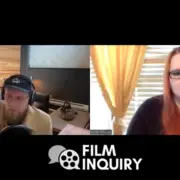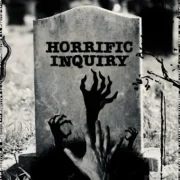Interview With Melissa B. Miller Costanzo, Director Of ALL THESE SMALL MOMENTS: On Making A Contemporary Film With Nostalgic Roots
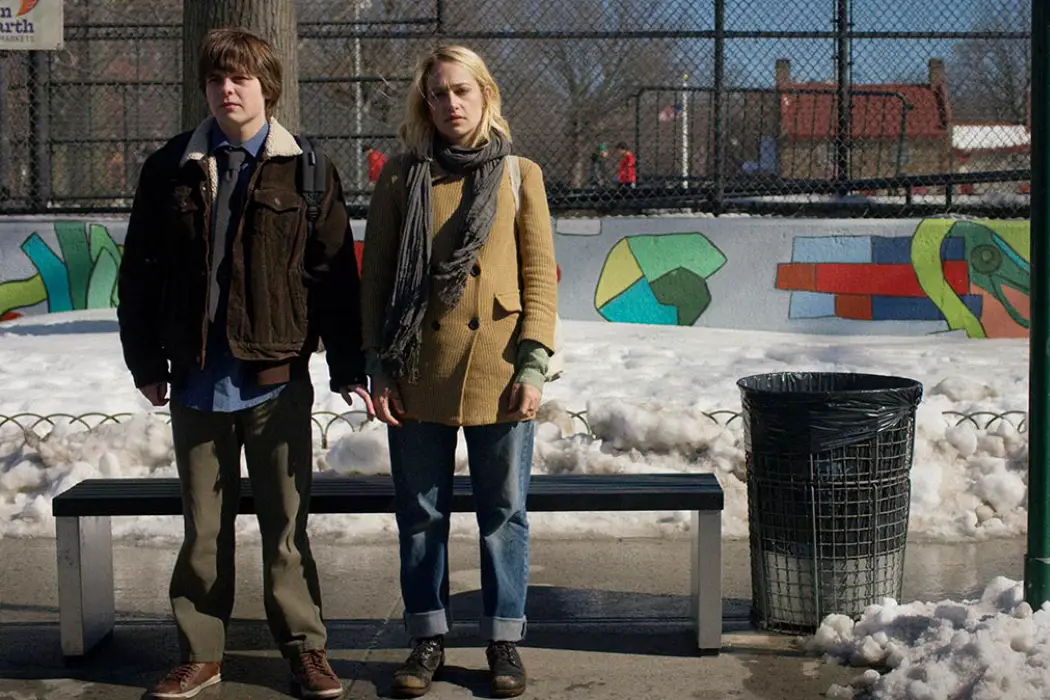
Rob Caiati is a writer and film critic with a…
Writer and director Melissa B. Miller Costanzo’s feature debut, All These Small Moments, is a tender coming-of-age drama that explores the imprecise nature of transitioning into an adult and the surprising relationships that can shape us along the way. Starring Molly Ringwald, in a role unlike any she has previously tackled, and up-and-coming actor Brendan Meyer, this tale of a young man coping with the growing pains of adolescence through his obsession with an older woman is as equally humorous as it is cuttingly authentic.
Costanzo, being no stranger to the film industry having worked in the art department and as a producer on a number of prestige dramas, including If Beale Street Could Talk and The Fighter, demonstrated a strong visual eye as All These Small Moments is notable in its visual flair throughout. I was lucky enough to have the chance to speak with Costanzo about her new film, what inspired her, casting the iconic Molly Ringwald, and why it was important to limit the role of social media.
Rob Caiati for Film Inquiry: Thank you so much for taking the time to talk with me today and congrats on your feature debut.
Miller Costanzo: Thanks, Rob.
I was able to see the film last week and I really appreciated the novelty of the story and the complicated nature of seeing a young man manage his angst through his obsession with an older woman. It’s a bit of a rarity, as many tales usually flip the genders.
Miller Costanzo: Yeah.
I know you previously mentioned that you had the idea from your own daily commute, but I’d love to hear more detail about your inspiration for the story and how it evolved over time.
Miller Costanzo: Yeah, I think that particular storyline, there’s a couple of different angles. One, in addition to the daily commute living in New York and how strange it is to start to see the same people over and over again and when you do it becomes a thing. It’s kind of rare, but also strangely common in the city as well. So, there’s that aspect of it. There’s also just an aspect in terms of things that I think about and I’m interested in which is kind of this line. Just this line that’s there in terms of things I know that I’m not supposed to do. And for whatever reason, whether it’s conscious or not, people cross the line. There’s also the idea of how far can I flirt with this line [and] also stop because I know I’m not supposed to do it. [Yet] there are things I’m thinking about in my mind, but I think that’s okay because I’m not really crossing a line but kind of are you?
So there’s that kind of interest to me. And I also think in my own life, there was a situation where I became sort of more and more interested in somebody. It was never anything that I acted on, of course. I was in a relationship but I think sometimes when you, especially in production, you work with people very closely, I think I might’ve mentioned something to my friend. She was like “You’re mentally cheating” and I was like, “I’m what? What are you talking about?”. But it’s a real thing and evidently it’s like an epidemic, so I don’t know. I think it’s just something that I like the idea of [questioning]. I remember my husband actually stopped going to get his hair cut from this one place because he was like, “I don’t know, we were flirting and I felt weird,” so he just stopped going. [laughs] Everybody’s line is different [and] what you feel comfortable with and what’s appropriate, that was something that is very interesting to me.
Right, ok cool.
Miller Costanzo: That’s the long-winded answer. [laughs]
No, no, it’s very interesting. So, the film touches on timeless themes related to growing up, so it seems like there was no one better than the iconic Molly Ringwald to be in this film. Could you tell me more about how her involvement came about and whether it was important to you that she specifically be involved for this role?
Miller Costanzo: When I wrote the movie, a lot of times people write with an actor in mind. That was not the case with this, but as we got into sort of casting mode, we started thinking about people. I for one sometimes feel that we see the same twelve actresses in these films, so I just thought to myself let’s not go down that checklist. I think there was something about Molly. She brought, obviously, familiarity to the table, so I feel there’s this built in “we feel like we know her,” and I thought that worked for this sort of nostalgic movie I wanted to tell. I also think that she gave a performance that we didn’t expect from her or that we’ve seen from her recently. So I think that that would be added incentive for me. There’s that built in “like we feel like we know her” but, wow, she’s doing something different that we haven’t seen and there’s a maturity and subtlety. Working with her made me realize how much work goes into giving a performance, how talented she really is and how present she is when she’s on set.
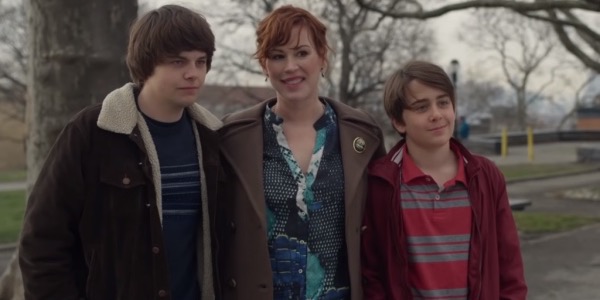
Yeah, I thought she did a great job. I was surprised to learn after watching that Howie’s brother Simon was played by Sam McCarthy, who happened to be Ringwald’s Pretty in Pink costar, Andrew McCarthy’s son. I’m just curious how that came to happen.
Miller Costanzo: Well, that was really interesting. So, I think a lot of times when you go into a movie that has minors in it, I think producers [prefer to] hire eighteen plus people to play all these roles. Howie was older than 18. That worked because I think there’s a youthfulness that comes across from him, but when we started to cast the younger brother, who’s 14 years old, I knew that it was just going to be tougher. We were looking at a lot of people that were too old, and I didn’t even know [Sam] was an actor. I hadn’t heard of him before this.
We get the tape and he just blew us away. For me, who came up with Andrew McCarthy and Molly Ringwald, his dad was reading the lines to him off camera and I’m like “Oh my God that’s Andrew McCarthy.” Which is super cool you know, but I [said] oh wait I have to look at this after. I can’t be stuck on listening to Andrew’s voice. So, we really liked Sam, and we brought him in. There was just something the second he walked in the room. He had a star quality, but in the other ear everyone kept saying, you’re going to have a hard time. You’re going to be limited, you’re a first-time director, you’re not going to have as much time to shoot, your hands are going to be tied with a minor.
So, it was a tough thing, but we couldn’t ignore how talented Sam was. He came in three times. Finally, we decided that we wanted to cast him, and I do remember feeling worried [about] how is Molly going to feel. I was kind of worried about bringing it up to her. We were in a fitting, and I just casually brought it up and I said, “Hey, isn’t it weird this is who we’d like to cast for the Simon character.” She was like, “Oh, that’s cool.” And that was the end of it. It wasn’t even a thing, and it was really wonderful. Sam totally brought it, and I can’t even imagine anyone else playing this role. So it ended up working really well and it was this wonderful coincidence basically.
Wow, that’s really interesting. I didn’t expect that.
Miller Costanzo: No, it wasn’t like some weird PR play on our part or anything. It was really a strange coincidence that he was brought to us and he was submitted to the role and he was just incredible.
Speaking of the character of Simon, one aspect of the film that I could see almost being overlooked was the relationship between Howie and his brother. I thought the relationship felt very true to life in the way that brothers, despite being very close, would likely cope with their parents separating in distinct ways. Could you tell me more about the brothers’ relationship and possibly the impact it had on Howie by the end of the film?
Miller Costanzo: Yeah, I think in a lot of ways, there’s a couple things. Howie, he was very well behaved and he never made waves, whereas, the Simon character, he always kind of said what Howie wanted to say [and] in a lot of ways had to act as the older brother. I think that [Howie] valued that relationship between the brothers. Even [during] a dumb kind of conversation they were having when they were brushing their teeth, the conversation I had with the actors was you know “Sam there’s something going on in your life that you want to talk to your older brother about. You’re kind of feeling him out and seeing if he’s present and if he’s going to listen to you”. Ultimately he realizes that Howie’s in “Odessa world” and it’s maybe not the time to open up. Then they just kind of move on. So not only is it just an accurate conversation these brothers would have, there is something deeper going on.
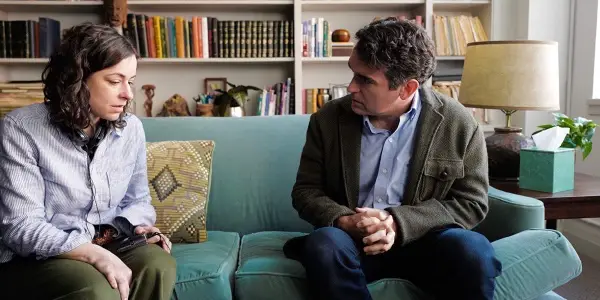
You have a lot of experience working in the art department on a number of films. I’m curious if you believe this experience was invaluable during your directorial debut, and if so, how?
Miller Costanzo: I think, yes. I think necessarily the art department maybe, but I think having that set experience, [as] I’ve also produced a couple movies. I started out as a production PA and so I’ve had my share of crying on the lift gate in the pouring rain at 2 AM. I think that’s important. When I started this movie, I realized that I’m much more comfortable on set and knew a lot more than I gave myself credit for because I’ve just been in the world for so long. I think a lot of times directors directing their first movie really don’t have that below the line experience and it’s hard for them to understand why the producers are telling them they can’t get what they want or having to decide between a piece of equipment and how many extras you have.
There are always problems on every movie that are specific to that movie, but a lot of times there are problems on movies that reoccur because of your budgetary constraints. I feel I was much more equipped to deal with it. My line producer would come up to me and tell me the dividers are up for this, this, and that, what do you think. So, I’d be able to not only come from a director’s perspective, but also from an art department perspective to help work through our budgetary constraints.
That makes sense. I thought the movie had a very distinctive visual style that made it stand out from other films. Additionally, in some ways, it was a very introspective film with a lot of visual storytelling and symbolism to unpack. I particularly appreciated the sunlight motif to convey infatuation throughout. I was curious if this symbolic aspect of the story was always planned or was it something you decided to focus on later to complement the quiet nature of the film?
Miller Costanzo: I always felt in my mind that Odessa was very ethereal and she was this sort of gift from God to Howie, [laughs] but of course it’s the expertise of my DP to actually find that light while we were working. He was very cognizant of how we need to shoot on this time of the day on the bus and there’s something about Jemima – that woman just found the sun! We kept joking that we couldn’t understand how she always just found the sun. So yeah, it was something we talked about, but it was also skillfully planned out by the DP as well just to make sure we could get that light and we could make her look that way.
I have to ask, because this could just be an instance of me looking too deeply into aspects of the story.
Miller Costanzo: Oh, God. [laughs]
But was Odessa’s coat meant to intentionally resemble the sweater Howie’s mother was knitting for him?
Miller Costanzo: Oh my God, not at all! I haven’t even noticed that. [laughs] I wish I could say “Of course, are you kidding me?” I think, if anything, it’s me as a person and the color palette that I respond to. It’s not a mistake that the yarn was that color. I’m sure I definitely planned that, but also it’s really funny that you noticed that because in the color correct, Odessa’s dress, the real dress that she wore, was this interesting weird lime green color. I always liked the design of it, but I knew I hated the color and the prop designer had to talk me into it. Then in the color correct, I completely changed the color of her dress into this mustard yellow, because I think that there are a lot of colors that have a code that I just have to get a knee jerk reaction to.
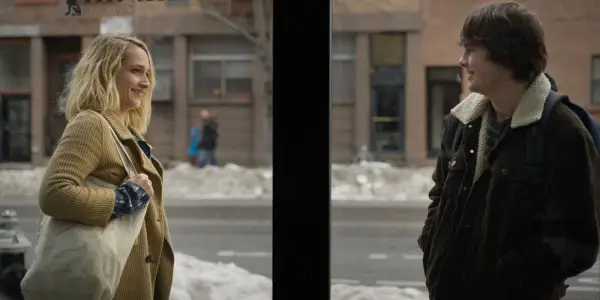
But I also think too that I did want to evoke a seventies mustard color you know rust to orange and those types of colors. So, I did choose the yarn specifically because it’s in the color palette, but I don’t think that is something that I have heard, so good for you for noticing that. [laughs] I wish I could take credit for it.
Okay, just curious. It was also really noticeable how, unlike recent coming-of-age dramas that focus on contemporary elements like social media, this movie really didn’t. I was curious if this was purposely excluded and what was your intention?
Miller Costanzo: So, I think it wasn’t consciously intentional, but I do think that’s again sort of who I am as a person. I grew up in the seventies, so I was kind of that last generation that looked at life without all the noise, you know what I mean?
Yeah.
Miller Costanzo: I think that I appreciate that and prefer it. I think I do remember the producers were like “Excuse me, we’re making a contemporary movie and there are no phones or social media,” and I was kind of like, “Hmmm, how do you like that?” And then I secretly gave myself a pat on the back, so it wasn’t like I didn’t set out to do it, but I do think that’s just part of my nature. So, when they brought it up I was like, oh shit, maybe they have a point. And I think the scene where Howie’s looking at Lindsay on Instagram, I kind of threw them a bone, but I also think that that was appropriate for the story. There was a little give and take there, but people have noticed that and I kind of appreciate it because who wants to watch a movie with kids being on their phones all the time anyway. It’s hard enough in real life, you know.
Yeah, and I thought it actually kind of helped emphasize the fact that Howie was sort of escaping the real world by not being on social media.
Miller Costanzo: I guess you’re right. Now that I think about if that were happening now, and we chose to build that in, he wouldn’t be following her on foot anyway. He’d probably be trolling her Instagram. [laughs]
I didn’t even think of that. Wow, yeah, that’s true. [laughs]
Miller Costanzo: Neither did I, but thank God, we didn’t do that. [laughs]
Before I let you go, I’d like to just know what’s next for you and if you have any projects you’re working on now or if anything is planned for the future?
Miller Costanzo: Yeah, I’m writing a script right now, and it’s been interesting being a female director and having a male protagonist and I felt like “Am I part of the tribe?”. This is not something that I really think about when I’m writing, but now my [next] protagonist [is] female. I’m writing a script about a ghost writer and she’s trying to get herself out of ghost writing. She thinks it’s not really a legit vocation and it [focuses on] her tumultuous relationship with her brother. So, it’s really exploring a brother sister relationship in my new project.
Cool, it sounds similar to this in some ways.
Miller Costanzo: Yeah, I know. I do believe that everyone always writes the same script over and over again. I feel like everyone is always exploring the same thing.
Gotcha. Well thank you so much again for taking the time to talk with me today.
Miller Costanzo: Of course. Thanks Rob.
Film Inquiry thanks Melissa B. Miller Costanzo for speaking with us!
All These Small Moments will be released in U.S. theaters January 17, 2019 and On Demand and Digital HD January 18, 2019. For all international release dates, see here.
Does content like this matter to you?
Become a Member and support film journalism. Unlock access to all of Film Inquiry`s great articles. Join a community of like-minded readers who are passionate about cinema - get access to our private members Network, give back to independent filmmakers, and more.
Rob Caiati is a writer and film critic with a passion for movies and TV of all genres. With an MA in Social and Consumer Psychology he is always fascinated by which stories are strongly resonating with society and why. You can find his other reviews and articles at Cinematic Insights (https://cinematicinsights.com).







